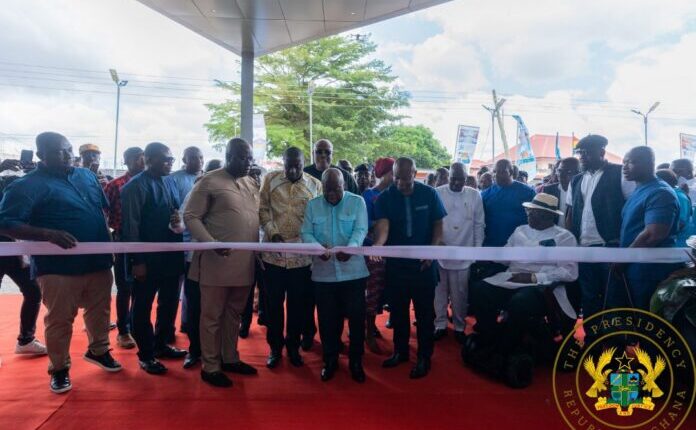Agenda 111 Will Provide Over 60,000 Jobs – Akufo-Addo
President Nana Addo Dankwa Akufo-Addo has revealed significant progress on 82 hospitals under the government’s Agenda 111 project, with a target of more than 60,000 jobs.
President Akufo-Addo disclosed this at the commissioning of the St. Michael’s Specialist Hospital at Abeka Lapaz on Saturday, September 30.
He stated that construction was progressing steadily at eighty-six (86) district hospitals, two (2) regional psychiatric hospitals, and the western regional hospital.
“The average completion rate of the 89 ongoing projects is fifty-two per cent 52%, with work at some sites being 70 to 80% complete”.
President Akufo-Addo added that the construction of all 89 hospitals is being undertaken by indigenous Ghanaian contractors, providing direct and indirect jobs to Ghanaians.
“There is an average number of 120 workers on each construction site, and, when completed, an average of 549 persons will be employed in a district hospital; 1,343 in a regional hospital, and 947 in each psychiatric hospital,” the President said.
He continued, “This means that 67,635 people will be employed in the Agenda 111 hospitals”.
“The Agenda 111 initiative is providing 101 standard 100-bed district hospitals with accommodation for doctors and nurses in districts without district hospitals; 6 new regional hospitals for each of the six new regions; rehabilitating the Effia-Nkwanta Hospital in the Western Region; building one new regional hospital for the Western Region; and two psychiatric hospitals for two of the three (3) zones of the country, i.e. Middle and North. The entire package is estimated at a cost of USD$1.765 billion”.
“Beyond the building of these new healthcare facilities, my vision is to help make Ghana the Centre of Excellence for Medical Care in West Africa by 2030, leveraging on Ghana’s favourable status in the Region as the most peaceful country in West Africa, a beacon of democracy on the continent, and a land of opportunities,” he said.
President Akufo-Addo reaffirmed his government’s commitment to improving access to essential and quality health services by providing the necessary health infrastructure, equipment and logistics, including the deployment of appropriate technology as part of the country’s drive to attain Universal Health Coverage (UHC).



